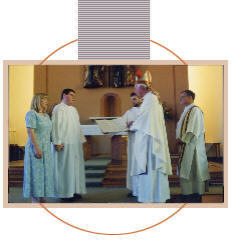



|
|
Overview |
|

![]()
The Journey and Service:
the baptised and ordained.
"Here am I among you as one who serves."
Jesus.
St. Thomas Aquinas requested in his prologue to On the Sacraments that people not separate out specific issues in their thinking about sacraments. In fact commentators did just this. The model of unity that Thomas set up was shattered.
This sort of thing happened a lot over the centuries and one of the effects was that there was a separating of things that were closely related. This has been especially so about ministry throughout the two thousand years of history of ministry since Jesus asked his disciples to ‘follow me’, ‘teach all nations’.
This separating out meant a narrowing down of the idea of priesthood in the Middle Ages where the Sacrament of Holy Orders was mainly seen in terms of the priesthood (priests, not Bishops and Deacons) and the offering of Eucharistic sacrifice. Ministry was narrowed down to clergy and religious.
Vatican 11 has broadened Holy Orders to re-establish the three fold structure of ordination, - Bishop, Priest, Deacon. It also widened the idea of ordination by saying that ordination to each of these three ministries was ordination to the threefold ministry of Word, sacrament and pastoral care. This was a return to the practice of early centuries. The renewal is now speaking of the ordained priest as the “presbyter’.
In these times we also see an explosion of other ministries. Pope Paul V1 in an exhortation on Evangelisation in the Modern World (Evangelii Nuntiandi 1975) gives a broad vision of lay ministries based on the movement towards greater community life. This is especially evident where the Church seeks to form basic or small Christian communities.
As well as Pastoral Associates - both religious and lay, women and men, serving communities alongside clergy - lay ministries of the Word and Eucharist abound as official ministries. Yet there are other ministries that serve youth, the home bound and people in Hospitals, Nursing Homes. There are Members of Parish Councils, Catechists, Musicians, Welfare Workers, Administrators, Financiers, Preparers of Liturgy, Marriage Counselors, Members of Cathechumate and Sacrament Preparation groups and many others. All this is a part of a renewal process that has not reached its final goal of the full expression of service as commanded by the Gospel.
Jesus' ministry was a ministry of service. He called twelve apostles to form a small group around him as he followed his vocation, a vocation that came to him in his Baptism in the Jordan by John and in his prayer in the desert that followed. He was tempted not to be true to that vocation yet he overcame the temptations and journeyed through the countryside as a travelling preacher speaking of the good news of salvation, the Kingdom, the Reign of God.
He summed up his mission in the synagogue at Nazareth when he quoted the prophet Isaiah:
The Spirit of the Lord is upon me,
because he has anointed me
to bring good news to the poor.
He has sent me to proclaim release to captive
and recovery of sight to the blind,
to let the oppressed go free,
to proclaim the year of the Lord's favour. (Lk 4: 18-19)
After the great events of his Passion, Death and Resurrection, and the events of Pentecost, communities gradually structured themselves according to the gifts of the people involved, gifts of service for the building up of the Body of Christ. Paul wrote a lot about these in his letters. Such ministry was wide-ranging and came from the Spirit. It was linked to being a member of the community.
These ideas have been recovered in our time as we speak of the church as the people of God, Christ's faithful, sharing in the three fold office of Jesus as priest, prophet and king.
One of the key developments about ministry from this recovery is the large participation of the faithful in ministry. This flows from an understanding of the priesthood of all believers.
This is the Priesthood that we were all immersed in through Baptism. The ordained priesthood is seen as one aspect, albeit an important one, of this common priesthood. Ordained priesthood is celebrated in the Sacrament of Holy Orders.
This concept of the priesthood of all believers entails an understanding of Ministry as something which is not exclusive to bishops, priests and deacons. We are all called to ministry. It gives us all the role of bringing the Gospel of Jesus to our world, evangelising, and being servants of that Good News. This is a leadership role that each person in the Body of Christ has to fulfill. This has affected our ideas about the role and exercise of the ordained ministry.
With the renewed emphasis on the ministry of the baptised, the role of the ordained priest is shifting. The collaborative nature of ministry leads to a real sharing in the mission and life of a community. The acknowledgment of many gifts in various people, men and women, young and old, and the shared decision making processes, become part of this transformation.
In this broader understanding of Ministry, as the vocation of all adult Christians, we are still left with the consideration of the Ordained Ministry and its role and significance in the ministering Community. This consideration is something that is being done in dialogue with other Christians and, hopefully, will help bring about reconciliation and unity.
One way into this is to distinguish between the gifts of the various ministries that we have spoken of and the order with which the community structures itself.
The ordained bishop, priest or deacon is one of the baptised that is chosen at the Ordination ceremony and acclaimed by the gathered people. The central ritual action of Ordination is the laying on of hands, with the prayer of blessing, invoking the Holy Spirit to descend. The ordained minister is to be a sign of unity, a symbol of ‘order’, of the communion of the people. The presbyter is an agent and witness to the God whose presence is appreciated in everyday experience in the world.
He (or in some Churches, in some cases, she) is ordained to preach, to care pastorally for the community and to focus its sacramental life. Sunday Eucharist is the particular occasion when the presbyter symbolically focuses and orders that communal life. The Eucharist is the place where all the gifts and ministries of the local Church community converge. The discerning and empowering Spirit is present through Word and Sacrament for all as the ‘source and summit’ of the community's life and mission.
The bishop serves the communion of all these communities in his Diocese. His preaching and leadership serves to connect the many diverse groups of people in Gospel unity. Such connection and diocesan unity is an expression of the fullness of the Church.
The Bishop also links the local church with the universal church. We see the Bishops as a ‘college’ that establishes unity. For the Roman tradition this unity is focused in the Papacy. National Conference of Bishops and other national and international gatherings, especially Synods, serve this unity and connectedness.
One of the difficulties that remain is the distinction and separation of the ordained and the baptised faithful. The restoration of permanent deacons and the exploration of the many diverse lay ministries can help relieve this tension. Another significant contribution is team approach to ministry that seeks the collaboration of people - lay, religious and clergy, men and women.
By keeping their secular jobs and by exercising liturgical and pastoral functions lay ministers and permanent deacons can especially express the link between life and liturgy, between the ordained and the baptised.
Our ideas and exercise of Ministry and the Sacrament of Holy Orders are still developing in these times. The core idea is that about many, diverse ministries. There is a long way to go.
Other challenging and key questions like the developing role of women, the recognition of ministries between churches and other religions, and the vocation crisis are being addressed as we seek in Holy Orders and Ministry to answer the call to the mission of Jesus, ‘Follow me’ and ‘ Preach the gospel to all’.
Further Reading
Cooke, Bernhard. "Ministry to Word and Sacraments: History and Theology." Fortress Press, Philadelphia, 1978.
A study of the development of ministry and holy orders from gospel times to the present.
|
|
|


Copyright © Anthony Kain 2009